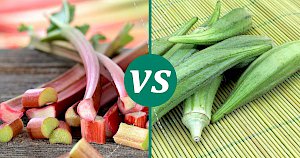Okra vs Rhubarb: Nutrition, Calories & Protein Compared


Okra vs Rhubarb
Nutrition Facts
Serving size:
change
5g10g15g20g30g40g50g60g80g100g120g140g160g180g200g220g250g300g350g400g450g500g600g700g800g900g1000g
1oz2oz3oz4oz5oz6oz7oz8oz10oz12oz15oz20oz25oz30oz35oz40oz50oz
Amount Per Serving:
Serving size:
change
5g10g15g20g30g40g50g60g80g100g120g140g160g180g200g220g250g300g350g400g450g500g600g700g800g900g1000g
1oz2oz3oz4oz5oz6oz7oz8oz10oz12oz15oz20oz25oz30oz35oz40oz50oz
Amount Per Serving:
Okra vs Rhubarb 100g Compare
| per 100g | Okra | Rhubarb |
|---|---|---|
| Calories | 33 | 21 |
| Carbohydrates | 7.5 g | 4.54 g |
| Fat | 0.1 g | 0.2 g |
| Dietary fiber | 3.8 g | 1.8 g |
| Protein | 2 g | 0.9 g |
| Calcium | 81 mg | 86 mg |
| Iron | 0.8 mg | 0.22 mg |
| Magnessium | 57 mg | 12 mg |
| Phosphorus | 63 mg | 14 mg |
| Potassium | 303 mg | 288 mg |
| Sodium | 8 mg | 4 mg |
| Zink | 0.6 mg | 0.1 mg |
| Vitaminium A | 375 µg | 102 µg |
| Vitaminium B1 (Thiamine) | 0.2 mg | 0.02 mg |
| Vitaminium B2 (riboflavin) | 0.06 mg | 0.03 mg |
| Vitaminium B3 (Niacin) | 1 mg | 0.3 mg |
| Vitaminium B5 | 0.245 mg | 0.085 mg |
| Vitaminium B6 | 0.215 mg | 0.024 mg |
| Vitaminium B9 (Folic acid) | 88 mg | 7 mg |
| Vitaminium C | 21.1 mg | 8 mg |
| Vitaminium E | 0.36 mg | 0.27 mg |
| Vitaminium K | 53 µg | 29.3 µg |
| Beta karoten | 225 mg | 61 mg |
Exploring the Nutritional Profiles of Okra and Rhubarb
When it comes to choosing vegetables for your diet, variety is key not just for flavor but also for the nutritional benefits. Two such interesting and nutritionally diverse vegetables are okra and rhubarb. Each brings its own unique set of nutrients to the table, making them excellent choices for anyone looking to diversify their diet. Before we dive into the nutritional comparison, let's explore some fascinating facts about these two vegetables.
Did You Know?
Okra, often associated with Southern US cuisine, is actually a staple in many parts of the world, including Africa and Asia. It's known for its unique texture and flavor, as well as its versatility in dishes ranging from stews to salads. Beyond its culinary uses, okra is packed with nutrients and has been linked to several health benefits, including improved heart health and blood sugar control.
Rhubarb, on the other hand, is often mistaken as a fruit but is indeed a vegetable. It's celebrated for its tart flavor, making it a popular choice for pies and desserts. Rhubarb's reddish stalks are the only edible part of the plant, as its leaves contain oxalic acid, which is toxic if consumed in large quantities. Despite this, rhubarb offers a range of vitamins and minerals and is a great addition to a healthy diet.
Nutritional Face-Off
Comparing okra and rhubarb reveals some interesting nutritional differences and similarities. Here's how they stack up against each other based on a 100g serving:
- Calories: Okra has slightly more calories at 33, compared to rhubarb's 21.
- Carbohydrates and Fiber: Okra leads with 7.5g of carbs and 3.8g of fiber, while rhubarb contains 4.54g of carbs and 1.8g of fiber.
- Fat: Both are low in fat, with okra having a minimal 0.1g and rhubarb slightly more at 0.2g.
- Protein: Okra contains more protein with 2g per serving, whereas rhubarb has 0.9g.
- Vitamins and Minerals: Both vegetables are rich in vitamins and minerals, with okra offering more vitamin A, B vitamins, vitamin C, and magnesium. Rhubarb, however, has a slightly higher calcium content.
While okra boasts a higher protein and fiber content, making it excellent for digestion and muscle maintenance, rhubarb's lower calorie count and unique flavor profile make it a fantastic choice for those watching their calorie intake or seeking a tart addition to their dishes.
Conclusion: Variety is the Spice of Life
In the end, choosing between okra and rhubarb comes down to personal preference and dietary needs. Both vegetables offer significant health benefits and can contribute to a balanced and nutritious diet. Whether you're drawn to the hearty texture of okra or the tangy taste of rhubarb, incorporating these vegetables into your meals can add not only a burst of flavor but also a boost of essential nutrients. So why not include both in your diet and enjoy the best of both worlds?
Okra 100g
33kcalCalories source
- 77% CARBS.
- 21% PROTEIN
- 2% FAT
Rhubarb 100g
21kcalCalories source
- 77% CARBS
- 15% PROTEIN
- 8% FAT
Compares of okra
- Okra vs Asparagus
- Okra vs Beetroot
- Okra vs Bitter Melon
- Okra vs Bok Choy
- Okra vs Broccoli
- Okra vs Brussels Sprouts
- see all compares of okra
Marcin Piotrowicz
calories-info.com creator
Healthy diet and healthy lifestyle promoter
Add comment